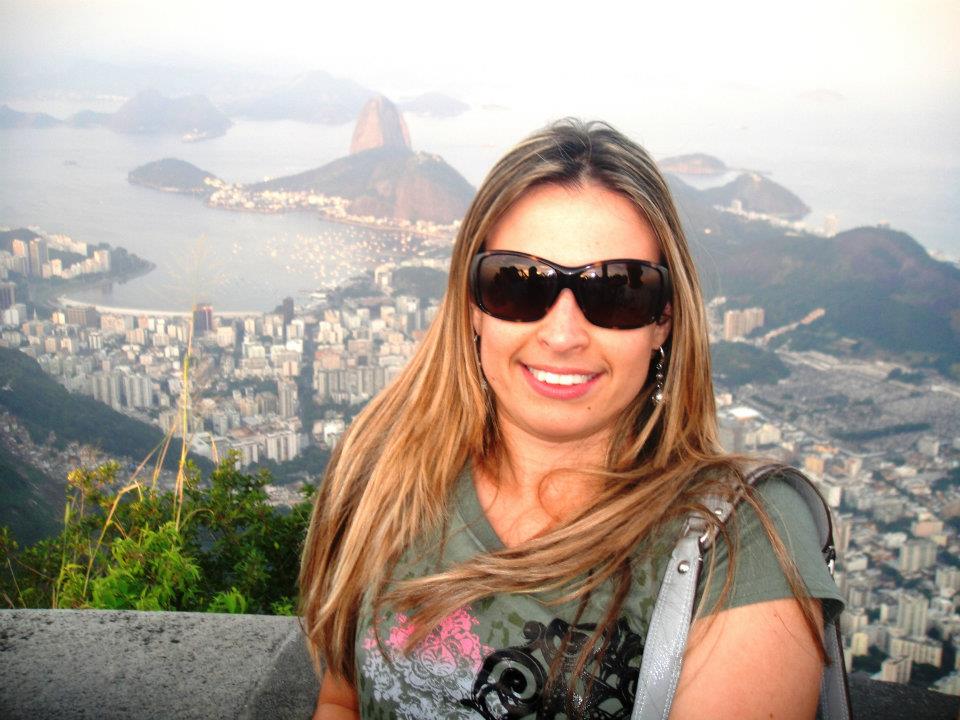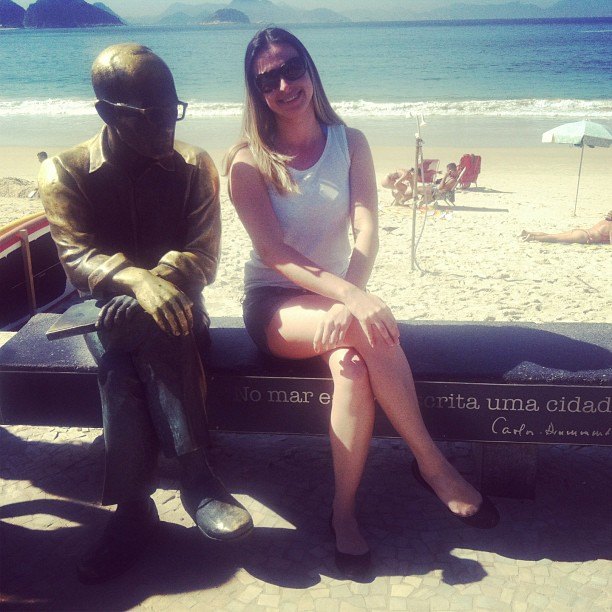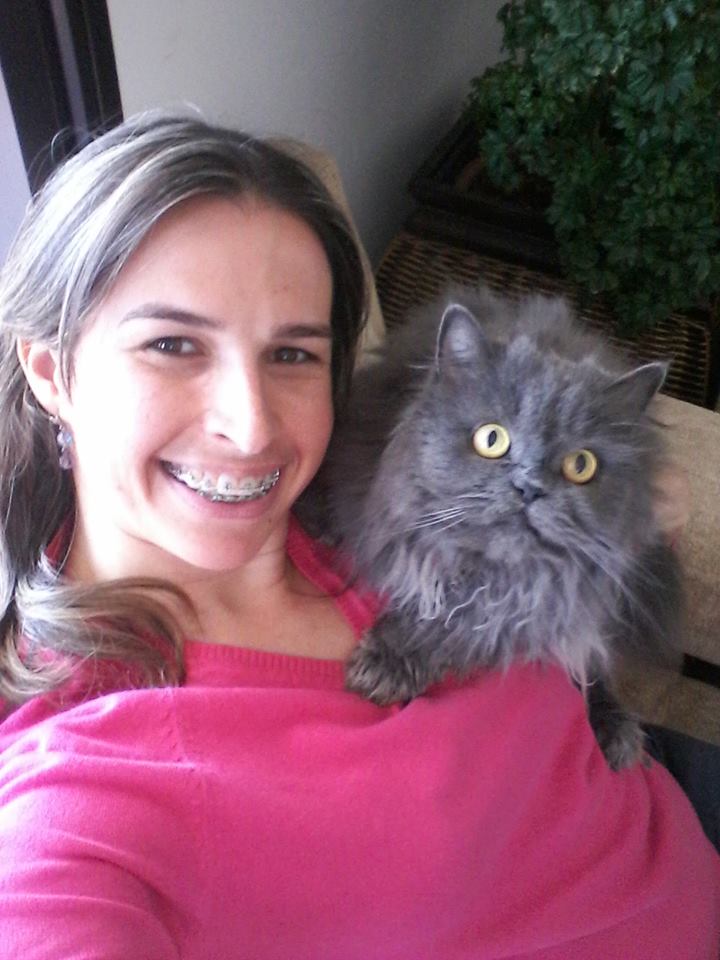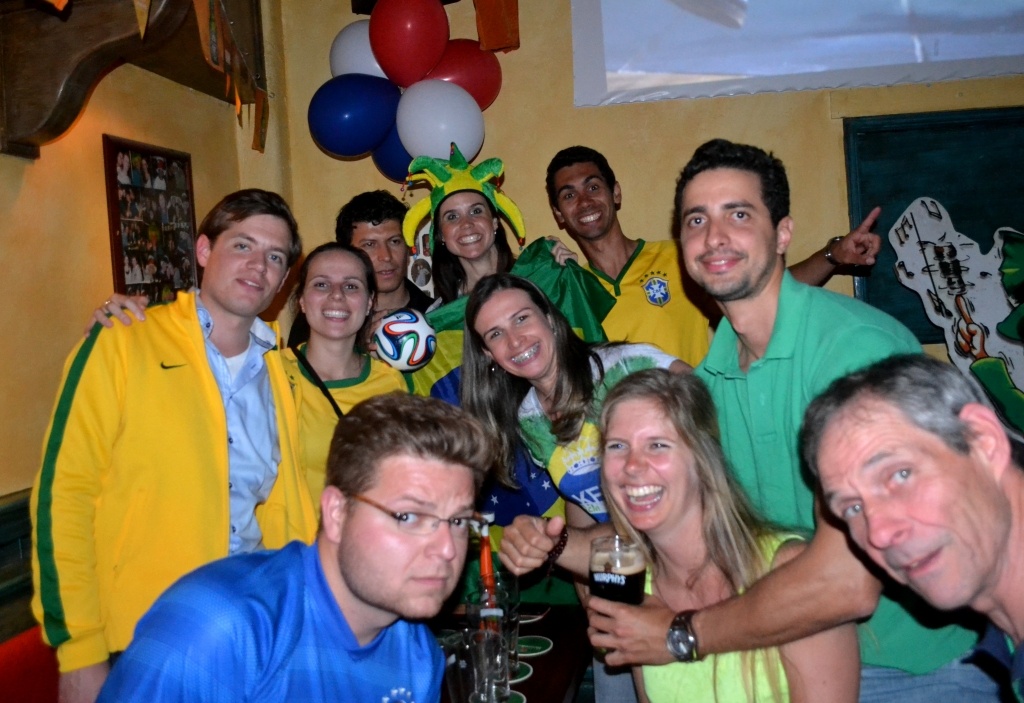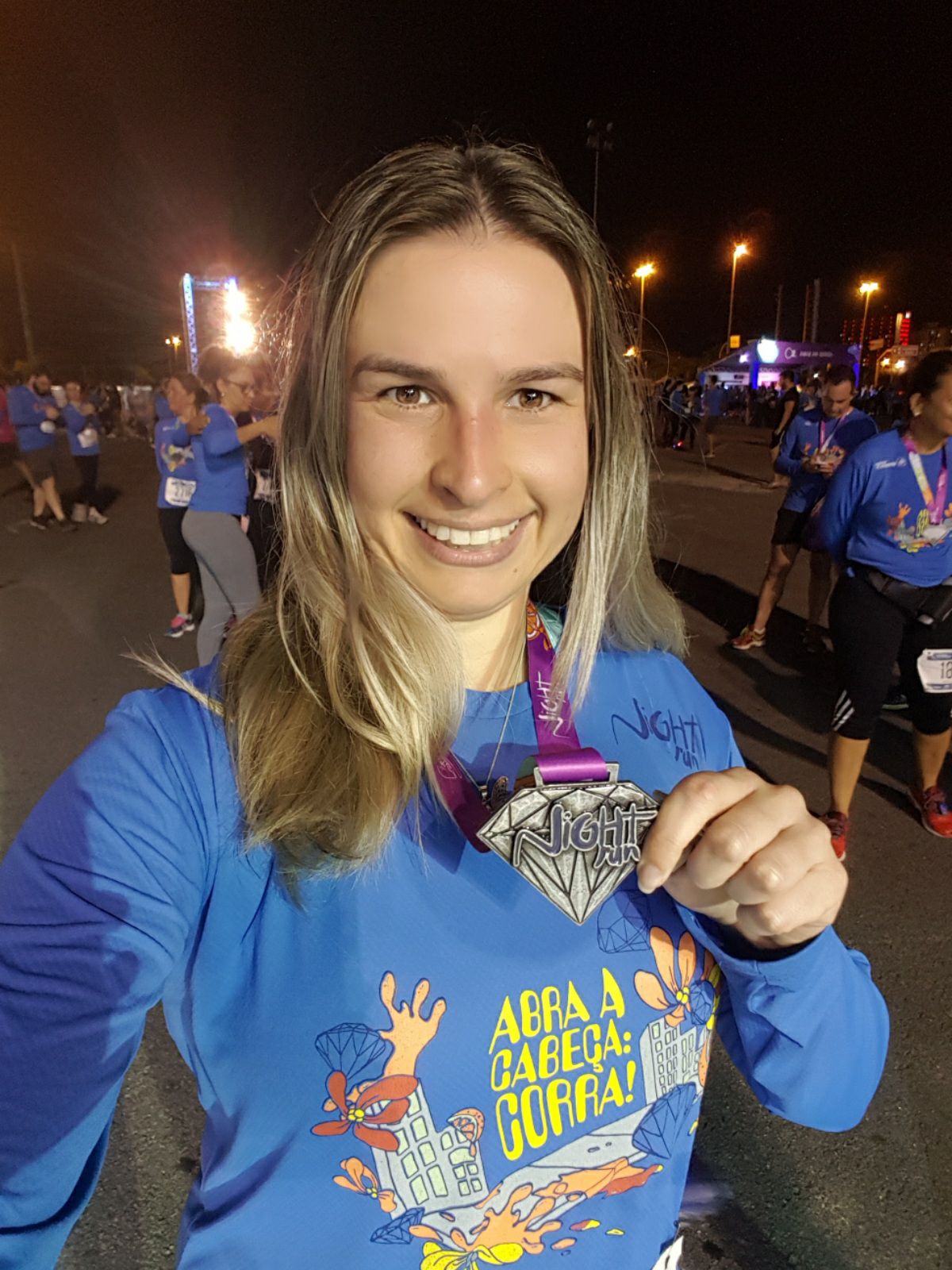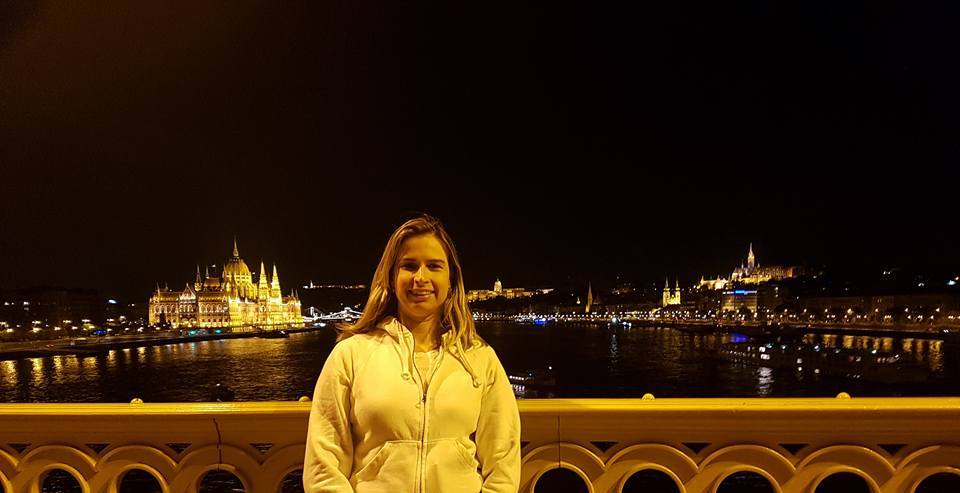RENATA MARTINS, BRAZIL (1980)
Renata Martins (Brazil) doesn’t want to be judged by anyone just on the account of having a rare disease as such. She doesn’t consider herself better or worse than anyone – and certainly not due to her medical condition.
I had my first HAE attack when I was five and at the same time, I was diagnosed. My mother was diagnosed 10 years earlier and her condition was confirmed through blood tests when she was expecting me. She faced a lot of problems before being diagnosed. She had many surgeries and had to go through years of suffering before finding out that she had HAE. At the time when my mother was diagnosed, there was no medicine available but it was a first step to at least know what kind of disease it was. Really, I consider myself lucky for her diagnosis when she was pregnant because due to that I didn’t face so many problems discovering the disease as she did.
How was would you describe your years in school – did HAE keep you away from school or were you able to manage without too much absence?
I had a pretty normal school life, really. At that time I didn’t know and understand the disease but as my attacks were mainly in the hands and the feet it wasn’t that much of a problem. My mom always told me to go to school and do the things that everyone else would do so in that sense I didn’t consider myself any different from other children.
My friends at school didn’t pay attention to my disease because I was very discrete. However, there was one teacher who didn’t believe me and used any opportunity to say that it was nothing and that I was only whining. It was only a few people from school who knew that I had HAE – basically, because people, in general, didn’t know about the disease and I didn’t tell them. Normally I would explain that it was an allergic reaction. I often went to the hospital to have painkillers, but at school, they didn’t know about that. Really, I lived with HAE alone, with no one knowing, except for my mother, naturally. I have an aunt and a cousin who also have HAE but they have had relatively few attacks and are not on any medication.
And how was the situation when you went on to your further education?
When I was a teenager I had several abdominal attacks. I missed school sometimes, but I was a good student, so this wasn’t a real problem for me. It was much worse when I wanted to travel with my friends and my mother wouldn’t allow me. She was worried about me having an attack and her not being near to help me. At that time there was no medicine for my age. Often I was angry about my disease, because it prohibited me from doing a lot of things, not least traveling with friends, going on student exchange and even doing some sports.
Talking about sports – are you doing any kind of sports now?
I played volleyball in school and college until I was 22 and even when I had a swelling that wouldn’t prevent me from playing. Nowadays, when I do jogging or running my feet always swell, but I keep doing it. I take care of myself, but I don’t stop doing what I like just because of HAE.
Despite the challenges of living with this disease, I do actually have a very good life. I try hard not to get upset about my symptoms or let them interfere with my daily routine. However, sometimes my HAE does prevent me from doing things because I am concerned I may have an attack.
So, in general, you are quite happy about your life – and you were so during your school years as well?
Yes, I would say so. During my years in college, I was always very strong and the swellings didn’t shake me, except when I had them in the abdomen or the face. My main concern was attacks on days of party or celebrations with friends, naturally. I didn’t face many problems in my school years. The worst was no doubt when I was 15 and traveled with my mother to New York. I had a crisis on the right side of my abdomen and went to the hospital. The doctor said that I had an ectopic pregnancy and even when I told him that it was simply not possible, he submitted me to embarrassing exams as he didn’t believe me – and didn’t know the first thing about HAE.
How would your characterize your working life?
In my previous job, I gave classes at my old university. That was actually the time where I was most annoyed about HAE because as a teacher I couldn’t miss classes. Whenever I had swellings to my hands I would hide them or said that it was due to an allergy – and I just prayed that I would not get a swelling in my face. The problem was really not the students, but my boss and my colleagues not believing me if I told them about a disease that they don’t know or understand as often it isn’t visible what happens to me. There was already some prejudice for me being a young woman giving classes for engineering students and I didn’t want to add to that. I didn’t want them to think of me as being weak or incapable of working as a teacher. I was therefore quite discrete about having HAE and I didn’t explain about it, even if my colleagues ask.
That is a matter of shame, I guess?
Shame has nothing to do with it, really. I just don’t want to be judged by anyone for having HAE. I’m not better or worse than anyone – and certainly not due to my medical condition.
I am currently working as a data scientist in a big company. When I applied for the job, I was afraid to talk about the disease and I omitted that for the first three months. I then exposed my condition in a discussion about diversity, promoted by the company. To my surprise, I was very welcomed, although many of my colleagues do not understand the battle I have to face almost weekly. I do not want to be labeled by the disease, but by what I am and what I can do, especially professionally.
Recently you went to stay in Europe for some months. What were your thoughts on traveling that far away from home and staying in another country, from an HAE patient’s point of view, I mean?
As mentioned HAE has previously prevented me from traveling but I decided that it shouldn’t be like that anymore. My mother was anxious because of me wanting to go to The Netherlands but in the end, I did. I won’t let HAE win over me.
And how would you characterize your European experience – did it work out?
It absolutely did. I took two kinds of medicine with me – a bradykinin receptor antagonist for the treatment of acute attacks and a synthetic steroid hormone for prevention. It didn’t keep me from having attacks on my hands and feet but I really didn’t worry much about that. During my stay in Europe, I had an abdominal attack but I refrained from taking the medicine I had because at that time I was still only half way through my trip. However, the pain increased and eventually I couldn’t avoid taking it.
In Brazil, it is very difficult to find proper treatment, mainly due to lack of knowledge with the doctors and access to medicine. Imagine how it was to be alone in a country where the language was a huge barrier. But I decided that it shouldn’t prevent me from going. Before traveling I contacted both HAE patients and the Dutch HAE organization and they helped me a lot with instructions regarding hospitals as well as doctors and procedures. That was a great relief but I was somewhat concerned that I would have attacks that could keep me from enjoying my trip. But in the end, it actually did work out – basically because my courage is bigger than HAE.
How would you describe your experience with doctors in your home country?
Good and bad, really. In general there are not many Brazilian doctors that know anything about HAE and naturally, that can cause problems. In the beginning of 2013, I had to undergo surgery for gallstones. Some doctors refused to do the operation when they heard my diagnosis but in the end, there was one who accepted.
In Brazil, a bradykinin receptor antagonist is used for acute attacks and after much bureaucracy to get this medicine before the operation, I took it with me and gave it to the doctor. However, the doctor didn’t know this medicine, so he gave me fresh plasma instead. After the surgery, I had to stay in the intensive care unit longer than a patient would normally do after such an operation. After complaining about the pain the physician on duty said that it was a very simple surgery and by that time I surely should be doing chores. She said I was occupying another person’s place. I felt so bad that when my mother came to see me I begged her to talk to my doctor to take me out of there. At that time I really needed to see a doctor who would believe me.
Despite this and similar episodes that I have been through, I am an optimistic person and I live well with HAE. It helps me a great deal to know that I am not alone – that there are in fact people around the world who face the same problems as I do. That is very comforting. I have found many friends who understand me and know how I feel. During difficult times I run to them.
How do you manage HAE now?
For a long period of time, I have been taking steroids daily but I find the side effects upsetting. When I do have to go to the hospital because of an attack, I get additional medication to treat the symptoms. A more recently approved treatment has become available in Brazil and I have had that on a few occasions. Unfortunately, it is expensive and very difficult to obtain because of bureaucracy, so together with other HAE patients in Brazil, I face challenges due to lack of specialized medical services, medical options and resources in general.
Living with a rare disease and not always having the best access to effective treatments can be somewhat lonely. I find it helpful to be near close family and friends – and also to be part of the Brazilian HAE organization, ABRANGHE. Support is critical for breaking down the emotional, social and political barriers that HAE patients face – and it helps us get through the direct physical symptoms such as pain, nausea, and edema.
I have recently gotten access to some medicines for crisis situations, but the process is long and bureaucratic. To get Icatibant or C1 Inhibitor, it is still necessary to prepare a judicial confrontation with the government in order to receive three to six doses at a time. Once the medicine is over, you need to ask for it again, taking up to two months to get new doses.
I take daily doses of attenuated androgen and tranexamic acid and when I have crises that I consider strong I take C-1 Inhibitor or Icatibant, depending on accessibility and availability.
Have you had any thoughts on possible parenthood?
As my grandmother has passed away due to glottis edema and both my mother and I have HAE, obviously I am very concerned about passing the disease on. However, I hope that when I do have children there will be safe and efficient medicines so we can all live calm lives.
HAE related topics that might interest you
Global Perspectives
Magazine with timely information on the issues, activities, and events that are relevant to the global HAE community
HAEi Advocacy Academy
Courses, advocacy training, and tools to support people living with HAE and becoming an HAE advocate
HAEi Connect Member database
Free, secure online membership database and communications platform for HAEi’s member organizations
HAE Companion app
Access to HAEi’s emergency card in many languages and ACARE Centers, HAE knowledgeable hospitals and physicians
Stay tuned – sign up for our newsletter
BE THE FIRST TO KNOW ABOUT HAE NEWS, TREATMENTS, EVENTS AND RELATED TOPICS



